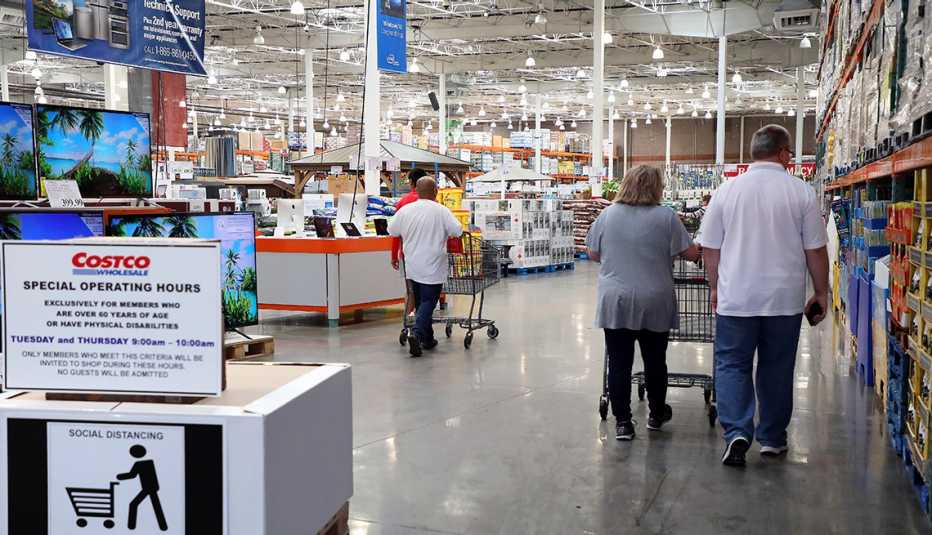Staying Fit
Buying in bulk can be a smart shopping strategy to save time and money. Especially in these pandemic times, when shopping trips should be limited, stocking up on staples makes sense. “A customer who might normally balk at 24 rolls of toilet paper or three pounds of coffee will instead find them attractive,” says Roger Dooley, marketing expert and author of Brainfluence: 100 Ways to Persuade and Convince Consumers with Neuromarketing. “A well-stocked pantry and home reduce consumer stress in uncertain times."


AARP Membership— $12 for your first year when you sign up for Automatic Renewal
Get instant access to members-only products and hundreds of discounts, a free second membership, and a subscription to AARP the Magazine.


Even pre-pandemic, it had its advantages. “Buying in bulk can be quite a bit cheaper,” says shopping expert Trae Bodge. “So in many cases, it's a great way to stay on budget.”
Just not in all cases. Some seemingly good buy-in-bulk deals may offer lower per-unit prices, but they can still be a big waste, especially if you can't use everything you purchase before your supply starts to turn. That might seem like common sense, but the oodles of items with expiration dates you have to watch out for may surprise you. “There are some items that degrade or lose their efficacy over time,” Bodge says. “So unless you have many people living under one roof, it's probably best to avoid” them.
Be sure to think twice about the following eight items before buying them in bulk.
1. Sunscreen
Bodge notes that skin care products containing SPF lose their protective powers over time. So even when the pandemic is nudging us all outdoors, resist the urge to go overboard with your supply of sunscreen.
First, check the expiration date. The U.S. Food and Drug Administration requires that all over-the-counter medications, including sunscreen, be marked with an expiration date unless the product is proven to maintain its full effectiveness for at least three years. If you don't think your household can use it all by that deadline, skip it. Stretching the shelf life past that date could prove hazardous to your health, as the weakened sunscreen leaves you more vulnerable to sunburns, sun damage and skin cancer.
You might even consider tossing a bottle earlier than expected. Open bottles of sunscreen (as well as some other lotions, face creams and personal hygiene products) are at risk of bacterial contamination — and the risk increases the longer they're open. Plus, exposure to sun and heat weakens SPF faster. So, many skin care experts recommend throwing away open bottles after a year. (Also, store unopened bottles in a cool place.)
2. Liquid detergents and cleaners
The pandemic may have boosted your hygienic habits and need for disinfectants and other supplies. But before you hoard all the cleaning products, remember that certain kinds lose their sanitizing strength over time. Liquid laundry detergent, for example, is best if used within six months of opening it or nine months to a year of purchasing it, according to lifestyle site The Spruce. Powdered detergents, including OxiClean and Clorox Oxi Magic, should be good for the long haul, as long as you literally keep your powder dry. In fact, both liquid and powder detergents ought to be stored in a dry, cool place in order to maximize shelf life.
Other Clorox products, including disinfecting wipes and bleach, typically have a shelf life of a year, according to the company's website. But The Spruce recommends discarding chlorine bleach after six months. Lysol disinfectant wipes and sprays begin to lose their efficacy after two years, according to Good Housekeeping. Multi-surface cleaners also work best within two years. (Hand sanitizers typically expire within two or three years, too.) If not stored properly — in a cool, dry place, out of direct sunlight — all these products are likely to degrade even faster.
3. Over-the-counter medicine
Budgeting expert Andrea Woroch recommends skipping bulk sizes of over-the-counter medicine. “It has an expiration date, and you only take it as needed,” she says.

































































